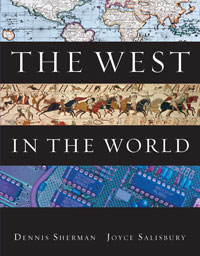
The West in the World, 4th Edition (Sherman)Chapter 17: Factories, Cities, and Families in the Industrial AgeChapter SummariesBetween 1780 and 1850, the industrial revolution transformed economic and social life in Britain. Industrialization began there because Britain enjoyed certain advantages over the rest of Europe and had already undergone an agricultural revolution. During the industrial revolution, new machines and the expansion of factories changed the traditional economy based on agriculture and handicrafts. Urbanization spread as industrial cities and towns sprang up throughout the country. This new industrial wealth translated into Britain's greater power in relations with both European neighbors and non-European societies. On the other hand, industrialization worsened health and living conditions in the new cities, particularly for the poor, and increased work-related injuries and the spread of disease. It also contributed to changing traditions within family life and transformed the image of the family as an economic unit. At the same time, workers began to organize unions and to think of themselves as a class in ways they had not within the guild system. |  |















